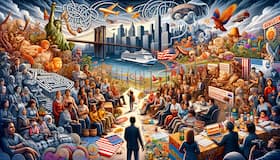The United States has long been known as a land of opportunity, attracting millions of people from around the world in search of the American dream. This influx has created a rich tapestry of cultural diversity, spurring innovation and economic growth. However, the path to residency or citizenship is fraught with complexity, reflecting the country’s changing stance on immigration.
Exploring the Impact of Immigration in the United States
Immigration has played a key role in shaping the demographic, economic, and cultural landscape of the United States.
The socioeconomic contributions of immigrants to the United States are both significant and diverse. Immigrants have been an integral part of economic growth, making significant contributions to the labor force in a variety of sectors such as technology, agriculture, health care, and entrepreneurship. They bring with them a variety of skills and perspectives, spurring innovation and filling critical gaps in the labor market. In addition, immigrants are known to be more likely to start businesses than native-born Americans, creating jobs and stimulating economic activity.
In addition to their economic contributions, immigrants have enriched the cultural fabric of the United States. The diversity of languages, traditions, and cuisines has broadened the American cultural landscape, contributing to a more inclusive society. This cultural diversity is not only a source of strength, but also a reflection of the nation’s historical roots as a melting pot of world cultures.
The Socio-Economic Impact of Immigration
Immigrants play a key role in the U.S. economy, contributing more than $1.5 trillion to GDP. They fill important roles in a variety of fields, from low-wage labor to highly skilled occupations. Despite this contribution, they often have to navigate a volatile landscape of legal challenges and social inclusion.
List of Contributions by Immigrants:
- Innovation and entrepreneurship
- Cultural diversity and enrichment
- Strengthening of labor markets
- Enhancement of demographic vitality
Legal Challenges and Policy Shifts
The legal framework governing immigration is a complex set of policies, laws and regulations. In particular, the 1965 Immigration Reform Act marked a significant shift by abolishing discriminatory quotas and emphasizing family reunification and skilled labor. Despite these achievements, the immigration policy debate remains a contentious issue that influences political discourse and the legislative agenda.
Table: Key U.S. Immigration Policies Over the Years
| Year | Policy | Impact |
| 1965 | Immigration Reform Act | Ended ethnic quotas, prioritized family reunification |
| 1986 | Immigration Reform and Control Act | Legalized undocumented immigrants meeting certain conditions |
| 2012 | DACA | Provided temporary relief from deportation for eligible youth |
The Future of Immigration
As the demographic landscape of the United States continues to evolve, the role of immigrants in shaping the country’s future is becoming increasingly important. Challenges of integration, legal status, and public perception are juxtaposed with the undeniable benefits of a diverse and dynamic population.
Frequently Asked Questions (FAQs):
- What are the main challenges immigrants face in the United States?
Immigrants often face legal uncertainty, difficulty integrating into society, and economic inequality.
- How do immigrants contribute to the U.S. economy?
Immigrants contribute through entrepreneurship, labor force participation, and cultural diversity, enhancing the country’s economic dynamism.
- What legal reforms are needed to improve the U.S. immigration system?
Reforms are needed to simplify the path to citizenship, protect the rights of undocumented immigrants, and address the root causes of migration.
- How can society contribute to creating a more inclusive environment for immigrants?
Promoting cultural understanding, ensuring equal opportunities, and advocating for comprehensive legal reforms are important steps towards inclusiveness.
For more insights into the role of advanced technologies in modern society, including their impact on immigration processes, explore our detailed analysis.
This exploration of the complexities of American immigration underscores the delicate balance between maintaining national security and protecting the values of diversity and opportunity that define the American spirit. As the nation moves forward, the contributions of immigrants to the fabric of society remain an integral part of its identity, challenging us to envision a more inclusive and equitable future.
To learn more about the development of technology and its impact on society, including the mobile app development industry, read here. Also, for a deeper understanding of the tools and symbols that shape our digital world, such as MATLAB operators.
